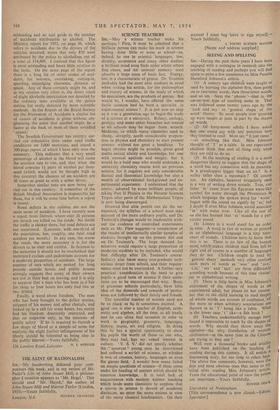SCIENCE TEACHERS
S1R,—May a science teacher make his apologia? First, it must be admitted that a brilliant person can make his mark in science having done little or none at school—as, indeed, he can in oriental languages, law, divinity, economics and many other studies;
a brilliant mind soon finds order where others find .chaos, and an' unusual memory soon
absorbs a large mass of basic fact. Energy, too, is a characteristic of genius. Dr. Toulmin probably had the most able students in mind when writing his article, for the philosophies and history of science, in the study of which he specialises, are the products of genius. But would he, I wonder, have offered the same facile solution had he been a specialist in experimental science ? It is not now so easy as it th as a generation ago to begin the study of a science at a university. Botany, zoology, geology and some other branches not treated at all schools may be begun from scratch. Medicine, to which many classicists used to chang: abruptly, needs considerable prepara- tion in physics and chemistry to start present courses without too great a handicap. To begin physics might be possible, given good matheuatical ability and knowledge, for one with unusual aptitude and insight; but it would be a bold man who would undertake a university chemistry course with no previous science, for it requires not only considerable factual and theoretical knowledge but also a wealth of observational background and ex- perimental experience. I understand that the coursz. adopted by some brilliant people, of taking Part 11 Physics in the Natural Sciences Tripos after parts of the Mathematical Tripos is now being discouraged.
Granted that able people can do the un- expected, the syllabus of a school must take account of the more ordinary pupils, and Dr.. Toulmin's changes would be inadvisable with- out the evidence of controlled experiments such as Mr. Flew suggests—a comparison of the results of intellectually similar samples of student; brought up on the present diet and on Dr. Toulmin's. The large demand for scientists would require a large proportion of moderate students to be included, who would find difficulty after Dr. Toulmin's course. Indus:ry also takes many non-graduate tech- nicians direct from school, and their require- ments must not be overlooked. A further very practical consideration is the need to give pupils a good taste of science if their ambi- tions are to be encouraged that way. Boys, at grammar schools particularly, have little idea of the demands and rewards of 'profes- sions not followed by their family and friends.
The specialist teacher of science need not be as \black as he is sometimes painted. A good one is also a teacher of English, arith- metic and algebra, all the time, at all levels, and he can often find occasion to refer to work in geography, geometry, languages, history, music, art and religion. In doing this he has a special opportunity to show his pupils the worth of these to one who, they may feel, has no vested interest in culture. ' V. S. V.' did not specify whether the " ignorant" young men he interviewed had suffered a surfeit of science, or whether it was of classics; history, languages or even the games field. I wonder how many failed on simple questions of science—if these come under his heading of matters which should be common knowledge. It is total lack of acquaintance with modern science .teaching which leads some classicists to suppose that a course in science is devoid of academic discipline, an error the more serious in view of the many classical headmasters. On their
account I must beg leave to sign myself,— Yours faithfully, A YOUNG SCIENCE MASTER [Name and address supplied.]










































 Previous page
Previous page